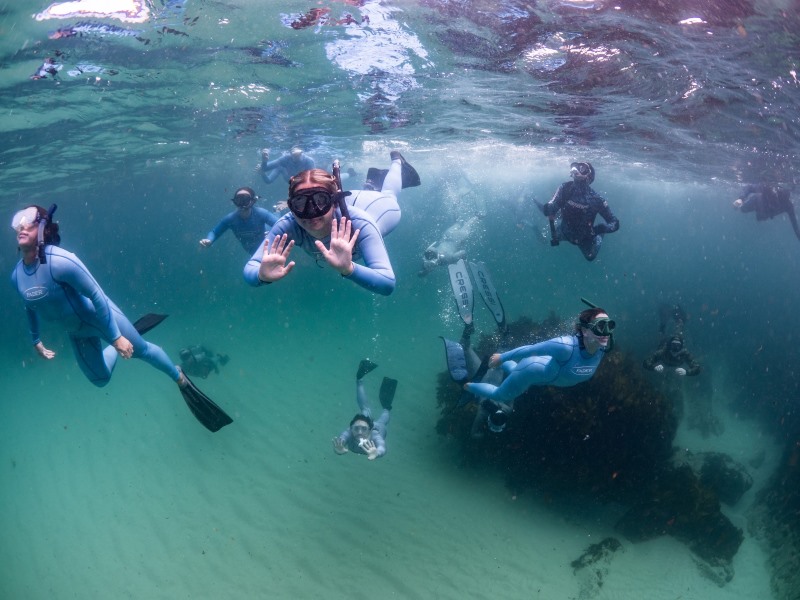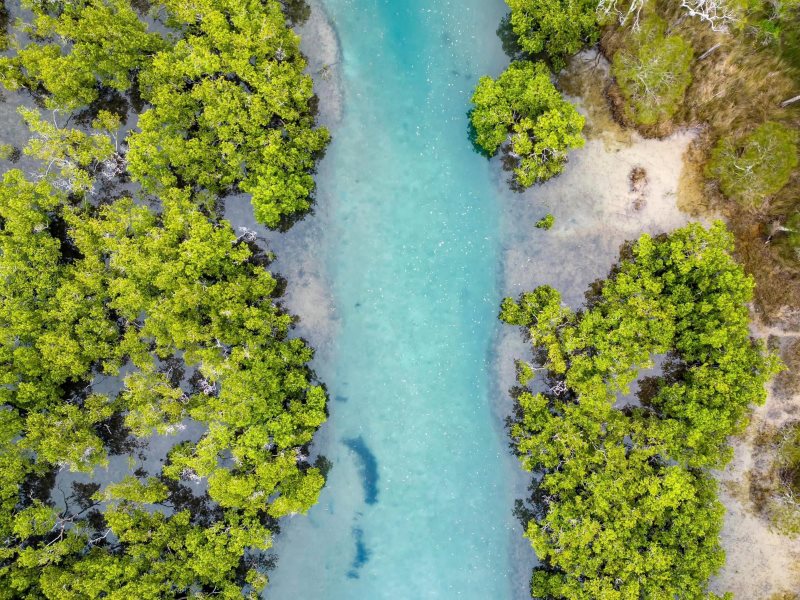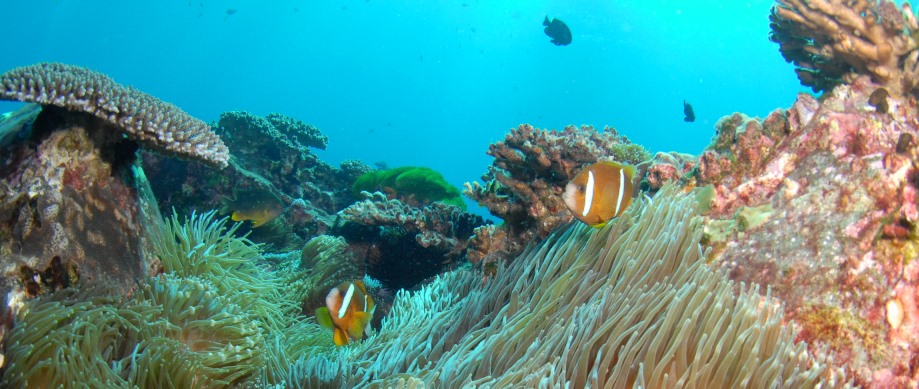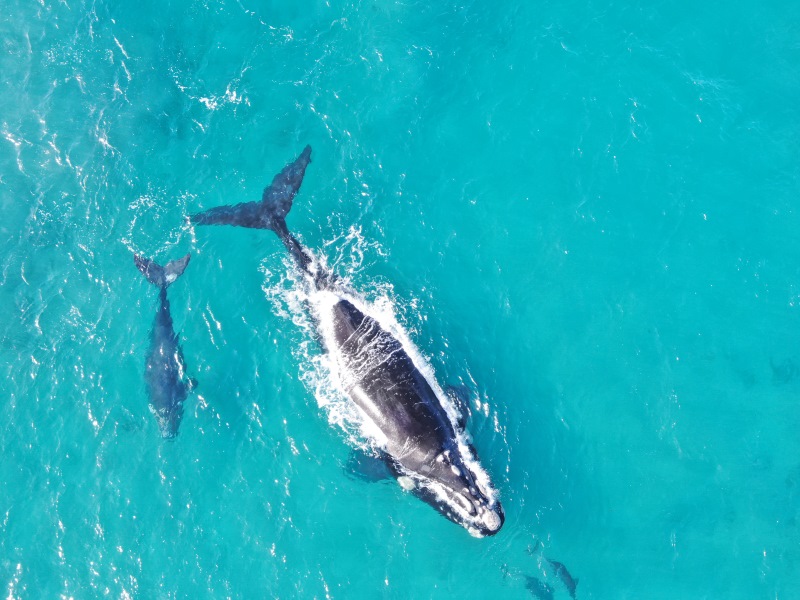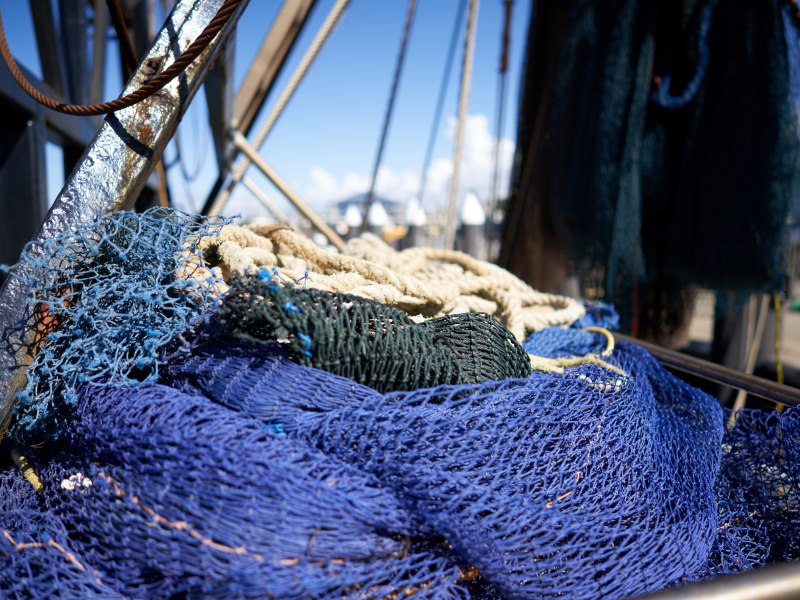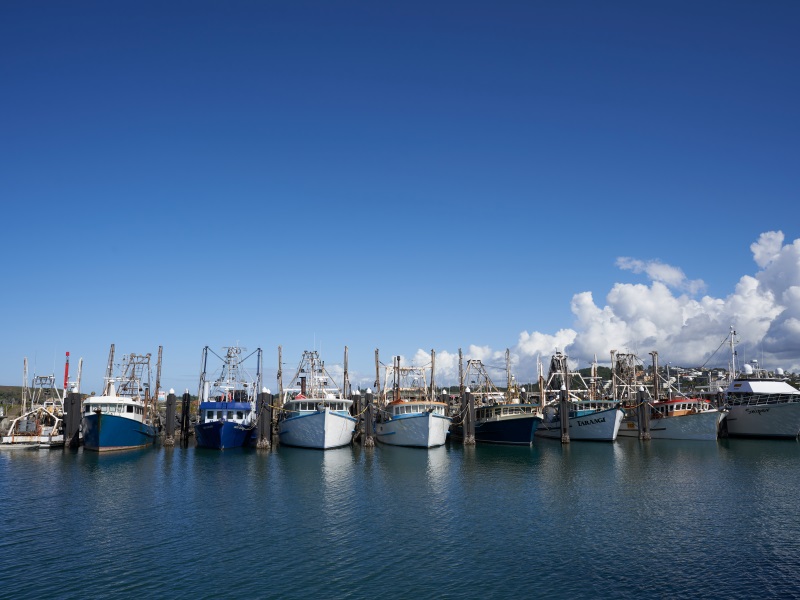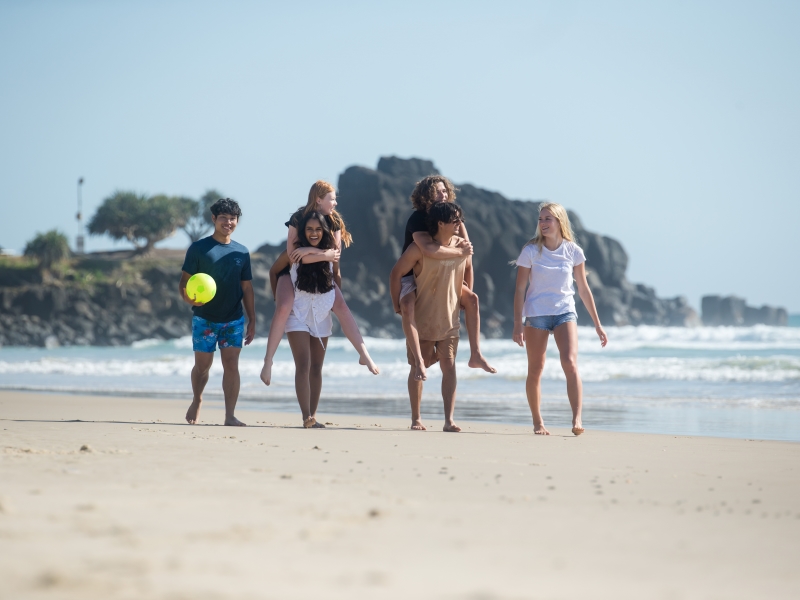Our projects
Water quality and litter (0)
Taking action to stop water pollution and litter before it gets into our waterways.

Aquatic biodiversity offsets
Develop and implement policy to protect high-value fish habitats through use of biodiversity offsets.

Building capacity on the risk-based framework
Helping waterway managers and industry understand how to apply the 'Risk-based Framework for Considering Waterway Health Outcomes in Strategic Land-use Planning Decisions' through workshops, resources and other tools.

Diffuse source water pollution governance framework
Improving management of water pollution from diffuse sources in NSW.

Clean coastal catchments monitoring
Clean coastal catchment monitoring will assess the benefits of on-ground activities that aim to reduce diffuse-source water pollution.

Clean coastal catchments on-ground
Undertake on-ground works in coastal catchments to improve land use practices that reduce nutrient and sediment run-off from the blueberry, greenhouse vegetable and intensive livestock industries.

Clean coastal catchments research
Working with farmers to keep sediment and nutrients on farms and out of coastal waterways. This is better for the environment and can support profitable and sustainable agriculture.

Coastal floodplain prioritisation study
Assessing coastal floodplain systems and infrastructure to assist decision makers in the enhancement of water quality, habitat and biodiversity.

Coastal wetland rehabilitation
Rehabilitating degraded wetlands to improve water quality, habitat and biodiversity within the wetland and downstream.

Construction sediment management
We are helping protect our waterways by providing accessible, best practice advice on erosion and sediment control for small scale building sites.

Estuarine water quality monitoring
Monitoring the water quality and health of estuaries to detect problems and see the benefits of improved management.

Fish friendly workshops for councils
Delivering an education program to council staff about the protection of fish and fish habitat.

Improving roads and tracks
Reducing sediment runoff into waterways from gravel roads and tracks by works such as road sealing.

Landuse pressures on the marine estate
Working to better understand pollution from agriculture and stormwater to help protect our coastal waterways.

Mapping outflow events
Mapping the flow of freshwater from rivers into the sea and measuring how much it impacts marine ecosystems.

Marine litter campaign
The Marine litter campaign supports both the NSW Litter Prevention Strategy, and the Marine Estate Management Strategy, extending the ‘Don’t be a Tosser!’ litter campaign message to include the marine estate.

Marine debris research and management program
Our scientists and collaborators are working on a strategic program to tackle the threats of marine debris in NSW.

Oyster reef restoration and research
Restoring and researching natural oyster reefs to improve water quality, aquatic habitat and biodiversity.

Review of the NSW Water Quality Objectives
Updating the NSW Water Quality Objectives for NSW coastal catchments.

Risk-based framework for regional waterway health
Support the establishment of a new governance framework for the Richmond River catchment to manage diffuse source runoff in a regional area.

Risk-based framework for urban waterway health
Apply the Risk-based Framework in South Creek as an urban diffuse source water pollution pilot.

Water quality working group
Working with other government agencies to improve the management of the marine estate’s water quality.

Riverbank vegetation improvements
Rehabilitating degraded riverbank vegetation to reduce sediment and nutrient runoff into waterways, help stabilise riverbanks and improve biodiversity.

Riverbank stabilisation
Protecting riverbanks from erosion to reduce the amount of sediment entering waterways.
Healthy coastal habitats (0)
Taking action to improve the management of foreshore and waterway structures to protect the marine environment.

Breakwater governance and management
Improving the management of breakwaters in estuaries by identifying responsible authorities for legacy breakwaters.

Coastal design guidelines review
Improving the design of coastal cities and towns by promoting environmentally friendly planning and infrastructure.

Coastal floodplain drainage management
Providing a framework for managing coastal floodplain drainage to improve water quality, simplify approvals and support viable primary industries.

Commercial dredging best practice
Implement the outcomes of the audit commercial dredging in estuaries that identified and recommended actions to improve licencing conditions and related environmental outcomes.

Domestic waterfront structure strategies
Developing estuary-wide strategies for jetties, pontoons and boat ramps to streamline approvals while protecting aquatic habitat.

Estuary bank management strategies
Developing environmentally friendly methods of bank stabilisation to manage foreshores and guide future investment.

Fish friendly breakwater maintenance
Developing guidelines and plans to include features in new and existing estuary breakwaters that will improve biodiversity, fishing and other social values.

ICOLL management
Developing an approval framework to support entrance management for intermittently closed and open lakes and lagoons (ICOLL).

Marine vegetation management strategies
Developing estuary-wide strategies for rehabilitating and protecting mangroves and saltmarsh so they are resilient to key threats.

Reconnecting fish habitats
Restoring fish passage at priority weir and road crossings so that fish can move, breed and thrive.
Reviewing jetty designs
Reviewing jetty design to better protect seagrass.
Subtidal reef monitoring
Surveying the marine life of rocky reefs of the Greater Sydney area.
Threats to estuarine fish assemblages
Assessing the impacts of marine infrastructure, stormwater drains and habitat condition on estuarine fish.

Threats to estuarine vegetation
Understanding the effects of human activities on seagrass, mangrove and saltmarsh.
Climate change (0)
Taking action to identify marine environments and species at threat from climate change.

Climate change citizen science
Using citizen science data to map changes in fish and other marine species distribution due to climate change.

Climate change monitoring
Scientists are using underwater cameras and diving surveys to check the health of more than 1,000km of NSW coastline.

Climate change research
Researching the effects of climate change to fill knowledge gaps and guide future management actions.

Climate change threats to seagrass, mangrove and saltmarsh
Identifying estuaries where mangrove and saltmarsh are most vulnerable to sea level rise and developing a model to better manage these areas into the future.

Informing the Climate Change Adaptation Strategy
Identifying climate change risks to our marine and coastal environments and supporting managers and communities to find adaptation solutions.

Investigating a blue carbon demonstration site on primary production land
This project aims to transform a 13-hectare peninsular adjacent to the Richmond River near Ballina, currently used for cattle grazing, into a blue carbon demonstration site. A boardwalk is planned to go through part of the site allowing members of the community to witness the progress of blue carbon ecosystem recovery at the site.

Estuarine habitat monitoring and threat assessment
Mapping estuarine habitats such as seagrass, mangrove and saltmarsh over time to assess their condition and threats.
Developing and delivering blue carbon strategy
The NSW Blue Carbon Strategy is an initiative to support evidence-based projects and research to protect and conserve important blue carbon ecosystems.
Aboriginal cultural values (0)
Taking action to increase active participation of Aboriginal people in managing the marine estate.

Aboriginal engagement
Evaluate current arrangements of Aboriginal peoples’ participation in Sea Country management and establish an effective Aboriginal engagement framework.

Climate change on culture
Investigate the impacts of climate change on Aboriginal communities and culture in the marine estate and develop strategies to reduce or adapt to this risk.

Cultural economic development
Working with Aboriginal communities to increase opportunities to work and develop businesses on Sea Country.

Cultural interpretations
Work with Aboriginal communities to increase cultural interpretation in marine parks. This will include signage and artwork depicting the stories and cultures of Aboriginal peoples’ connections to Sea Country and will be developed with Aboriginal communities to increase public awareness of Aboriginal cultural values.

Cultural research and monitoring
Develop a research, monitoring and evaluation approach that is integrated with the Aboriginal engagement framework (Aboriginal engagement project) and aligns with overall Monitoring Program.

Cultural site protection
Undertake local cultural research activities with local Elders and communities, starting with Buckenbowra fish trap.

Pipi harvest
Implement Stage 2 of Safe and Sustainable Sea Country Harvest of Shellfish project enabling Aboriginal people to harvest pipis and consume them safely for cultural purposes.

Reviving culture
Work with Aboriginal communities to maintain or revive cultural knowledge and practices of Sea Country.

Sea Country management
Enhance opportunities for Aboriginal employment in NSW Government to manage Sea Country.

Sea Country plans
Develop Sea Country plans with Aboriginal communities.

Sea Country rangers
Work with Aboriginal communities to design and deliver a caring for Sea Country ranger model and activities across the marine estate.
Threatened & protected species (0)
Taking action to protect threatened and protected marine wildlife from harm.

Education to protect and conserve marine wildlife
Explaining the need to protect marine threatened and protected species and the importance of community to achieve this.

Estuary General Fishery observer survey
Analysing data from the Estuary General Fishery to address threats to fish from bycatch and harvest.

Improve reporting of interactions with marine wildlife
Improving reporting and data sharing on marine threatened and protected species to support evidence-based decisions about marine wildlife management.

Observer survey prioritisation
Updating the commercial fishing observer prioritisation to address threats to marine ecosystems.

Partnerships to protect marine wildlife
Strengthening partnerships with government, community and industry to enhance the management, incident response and rehabilitation of marine threatened and protected species.

Planning to protect marine wildlife
Improving strategic planning and coordination of marine threatened and protected species programs across NSW.

Species monitoring
Undertake research and monitoring to help fill key knowledge gaps identified in the statewide TARA, and to address cumulative threats to marine wildlife, monitor trends in threats and the health and condition of their habitats.

Strategies for mitigating species interactions
Developing and implementing strategies to reduce interactions between commercial fishing gear and threatened and protected species.
Sustainable fishing & aquaculture (0)
Taking action to support commercial, recreational and Aboriginal cultural fisheries and aquaculture to be economically viable and ecologically sustainable into the future.

Aquaculture socio-economic research
This project will undertake a socio-economic valuation of the aquaculture industry in the marine estate, filling key social and economic knowledge gaps.

Commercial Fisheries socio-economic research
This project will produce an annual time series of economic and social indicators for NSW commercial fisheries, filling key social and economic knowledge gaps.

Cultural fishing monitoring
Explore potential pathways to enable assessment of cultural fishing in NSW in terms of participation, catch and effort and relate these aspects to access arrangements within current resource management decision making processes including harvest strategies.

Eat more NSW seafood
The Eat More NSW Seafood grants program provides seafood businesses with resources to help promote their produce and get more local seafood on plates in NSW.

Fisheries enhancements
Improve recreational fishing access by fish stocking and installing fishing infrastructure including artificial reefs.

Fishing industry marine stewardship
Develop information and training package in partnership with key fishing sectors and assist in delivery.

Harvest strategy development
Developing harvest strategies for use by commercial, recreational and cultural fishers to reduce the risks of fishing on species of concern.

Harvest strategy research
Develop and operationalise NSW Government policy and guidelines on fisheries harvest strategies, and progress assessment and management of ecological risk posed by NSW fisheries, prioritising potential management responses.

Marine biosecurity awareness
Using social research into recreational boaters' knowledge of the risks of aquatic pests and diseases to develop a communication and behavioural change management program.

Oyster aquaculture business and environment
Assist the recovery of oyster aquaculture farms affected by natural disaster events and incentivise innovative solutions that mitigate future impacts and ensure resilient businesses and sustained healthy estuaries (new project).

Recreational fishing environmental assessment
Limiting the environmental impacts of recreational fishing by completing an environmental impact assessment and a recreational fisheries strategy.
Safe & sustainable boating (0)
Taking action to provide boating access to our waterways that is safe and protects marine environments.

Boating Now
Working with partners in the Boating Now grants program to improve environmentally sustainable access to the marine estate and manage conflicting uses.

End-of-life vessel management
Develop options to manage vessels that are reaching or have reached the end of their useful life to mitigate potential environmental risks and enhance access to moorings.

Environmentally friendly moorings
Establish a performance-based standard for Environmentally Friendly Moorings (EFM) and review policy and regulatory options for improving adoption and maintenance of EFM.

Maritime infrastructure
Working collaboratively with key stakeholders to invest in maritime infrastructure as part of the Maritime Infrastructure Plan 2019–2024.

Mooring access
Optimising mooring density in mooring fields to better meet demand.

Mooring strategy
Review and modernise the strategy for mooring management and administration to improve access to moorings.
Review of offshore anchoring
Review and investigate the effects of large commercial shipping vessel anchoring within the Greater Sydney region.

Vessel environmental standards
Continue to enforce environmental standards and regulations among domestic commercial vessels and recreational vessels.

Vessel monitoring
Analysing data in shipping movements and interactions with threatened and protected species to identify knowledge gaps.
Enhancing community benefits (0)
Taking action to increase understanding of the way we all use and share the marine environment.

Blue economy
Working across multiple sectors to develop a Blue Growth Strategy for NSW which explores opportunities for coordinated, innovative, long-term, sustainable development of the marine estate with a focus on those current and emerging activities which provide the greatest opportunity for sustainable growth for NSW (project to commence in future years).

Community wellbeing framework
Collecting social, cultural and economic data to provide a foundation for long-term monitoring of community wellbeing associated with the marine estate.

Marine estate education strategy
Implementing the NSW Marine Estate Education Strategy and curriculum-based schools package.

Marine estate economic valuation and benefits monitoring
Developing a comprehensive and robust valuation framework across the NSW marine estate.

Maritime heritage review
Assessing threats to marine historic heritage and recommending strategies to manage those threats.

Values and activity mapping
Pilot a comprehensive, spatial mapping project of human use activities, to support marine planning prioritisation and management. Project to continue in future years

NSW Marine Estate Community Wellbeing Surveys
The community wellbeing surveys provide valuable insight into our coastline from Coastal Residents, Youth and Visitors. Using the responses to the surveys, we can track the benefits, threats and trends in community wellbeing over time.

Connections to Sea Country - Aboriginal People of Coastal NSW survey
The Connections to Sea Country – Aboriginal Peoples of Coastal NSW Survey (Wave 1) is the first survey of its kind, aimed at improving our understanding of Aboriginal peoples' cultural connections to Sea Country and the impacts on these connections.

Teacher resources for primary schools
Find resources and activities for schools on this page.
Effective governance (0)
Taking action to trial new ways of managing our marine environment that are more efficient and effective, simpler and clearer for everyone and provide greater opportunities for stakeholder involvement in decision making.
Greater Sydney region compliance focusing on marine protected areas
Achieving optimal compliance through educating the community and other stakeholders, and enforcing fisheries and aquatic reserve rules and regulations.
Improved marine protected area planning and management
Improving the management of our NSW marine parks and aquatic reserves.

Improving project governance
Reviewing projects to determine where governance is embedded and identify gaps that need to be addressed.
Latest News
View allOn Blue Carbon Country with Bullinah River Rangers
NSW Department of Primary Industries and Regional Development, in collaboration with Jali Local Aboriginal Land Council, hosted an On Country Day at the Duck Creek Research Station.
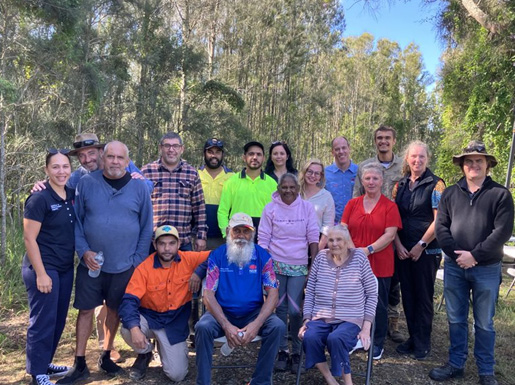
Survey reveals what Sea Country means to Aboriginal Peoples
The recent Connection to Sea Country – Aboriginal Peoples of Coastal NSW survey has confirmed the crucial significance of Sea Country to cultural connections, and the social and emotional wellbeing of Aboriginal Peoples.
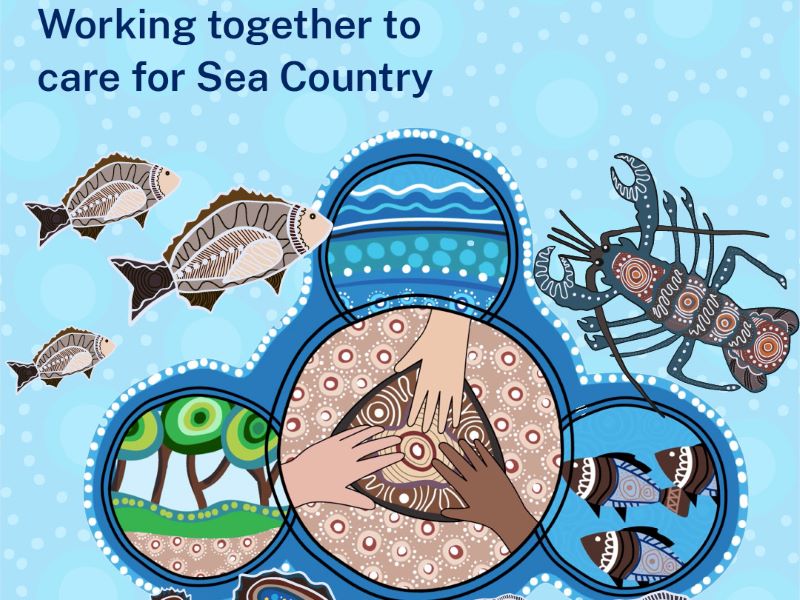
Anchors ahoy: New Port Kembla anchorages will protect seafloor life
A world leading approach to the anchoring of ships has been introduced in Port Kembla to protect the marine life of the region’s rocky reefs.

